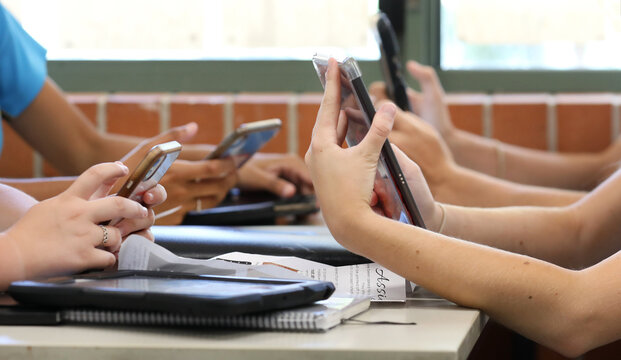Should teachers take away phones in class? It is a rising question as technology becomes more integrated in our lives and a pressing matter in schools. Many worry that allowing kids to have phones in the classroom is distracting and hinders learning. The worry of phones distracting kids does have validity, according to an article from Love to Know “64% of students say they’ve texted in class and 25% have made or taken a call.” Later in the article it is also stated that 46% of students also play games on their phones during class time.
Teachers are at the forefront of this argument, and many have started taking away student’s phones in classrooms. But these actions by teachers have recently come under scrutiny as they may be detrimental to students. In fact, in an article by Niles West News argues that “Teachers picking up our cell phones shouldn’t be allowed, unless it is causing a major distraction and used inappropriately.” but inappropriate usage is subjective.
However, those against phones being taken away make the point that phones are an important device that allows for communication between students and their parents. Without phones many argue that the separation of student and parent may lead to more serious conflicts going forward. The answer is not clear about what should be done about phones in classrooms, many argue that cellular devices are too much of a distraction while others argue that taking away a vital recourse for children may cause unintended side effects. This debate will continue to go on as technology becomes more involved in our day-to-day lives.
As a student in high school that has firsthand experience with cell phones in class, students are much more productive with their phones allowed in classrooms. I understand the struggle of teachers having to compete with cell phones for attention from students, but I feel that older generations do not understand how kids interact with their phones. And this misunderstanding is what causes the most distraction in classrooms.
Cell phones play a critical role in students communication and by trying to remove that line of communication and security makes students nervous and defensive. Studies do show that people can become addicted to their phone so much so that they experience withdrawal without it. So, by taking away cell phones from addicted students they will become more anxious and less likely to listen due to them being affected by phone with drawl.
Furthermore, teachers should strive to teach their class in a way that engages students rather than just having them sitting and listening. Giving students some autonomy in group projects or simulations can be very engaging and will often spur kids to pay attention because they are physically doing something that is not writing or filling in bubbles. But no matter what is going on in the classroom, do not take away phones or threaten the students with punishment. Negative reinforcement is the worst way to enforce behavior. Try positive reinforcement like offering extra credit for those who do not use their phones in class or some other reward system.
Cell phones are a distraction in the classroom, but by eliminating them, you further create a bad relationship with your students to a point where they will pay less attention and will often reject the class. Let kids keep their phones but set up clear boundaries with rewards for those doing well. Until we can find a solid solution, this is the best course of action.
Eide, Tine A., et al. “Smartphone Restriction and Its Effect on Subjective Withdrawal Related Scores.” Frontiers in Psychology, vol. 9, Aug. 2018, p. 1444. PubMed Central, https://doi.org/10.3389/fpsyg.2018.01444.





